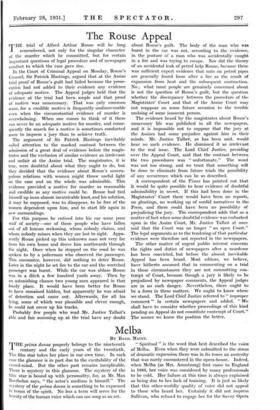The Rouse Appeal
II HE trial of Alfred Arthur Rouse will be long remembered, not only for the• singular character of the murder which he committed, but for certain important questions of legal procedure and of newspaper conduct to which the case gave rise.
In the Court of Criminal Appeal on Monday, Rouse's Counsel, Sir Patrick Hastings, argued that at the Assize trial proof of Rouse's guilt had failed because the prose- cution had not added to their evidence any evidence of adequate motive. The Appeal judges held that the evidence at the trial had been ample and that proof of motive was unnecessary. That was only common sense, for a Credible motive is frequently undiscoverable even when the circumstantial evidence of murder is overwhelming. When one comes to think of it there can never be an adequate motive for murder, and conse- quently the search for a motive is sometimes conducted more to impress a jury than to achieve truth.
The argument of Sir Patrick Hastings inevitably called attention to the marked contrast between the admission of a great deal of -evidence before the magis- trates and the exclusion of similar evidence as irrelevant and unfair at the Assize trial. The magistrates, it is true, were doubtful about what they ought to do, but they decided that the evidence about Rouse's unscru- pulous relations with women might throw useful light on the case and on the whole was admissible. This evidence provided a motive for murder as reasonable and credible as any motive could be. Rouse had tied himself up in an almost inextricable knot, and his solution, it may be supposed, was to disappear, to be free of the women dependent upon him, and to start life again in new surroundings.
For this purpose he enticed into his car some poor waif of society—one of those people who have fallen out of all human reckoning, whom nobody claims, and whom nobody misses when they are lost to sight. Appa- rently Rouse picked up this unknown man not very far from his own home and drove him northwards through the night. Once when he stopped on the road he was spoken to by a policeman who observed the passenger. This encounter; however, did nothing to deter Rouse. Later in the night he set fire to the car and the wretched passenger was burnt. While the car was ablaze Rouse was in a ditch a few hundred yards away. Then by an astonishing chance two young men appeared in that lonely place. It would have been better for Rouse to have remained hidden, but apparently he was afraid of detection and came out. Afterwards, for all his lying, some of which was plausible and clever enough, he could not cover up his tracks.
Probably few people who read Mr. Justice Talbot's able and fair summing up, at the trial have any doubt about Rouse's guilt. The body of the man who was burnt in the car was not, according to the evidence, in the posture of a man who was accidentally caught in a fire and was trying to escape. Nor did the theory of an accidental leak of petrol help Rouse, because there was sufficient expert evidence that nuts on petrol pipes are generally found loose after a fire as the result of expansion from heat and the subsequent contraction. No; what most people are genuinely concerned about is not the question of Rouse's guilt, but the question whether the discrepancy between the procedure of the Magistrates' Court and that of the Assize Court may not reappear on some future occasion to the terribk undoing of some innocent person.
The evidence heard by the magistrates about Rouse's unsavoury life was published in all the newspapers, and it is impossible not to suppose that the jury at the Assizes had some prejudice against him in their minds: Mr. Justice Talbot, as has been said, would hear no such evidence. He dismissed it as irrelevant to the real issue. The Lord Chief Justice, presiding over the Appeal Court, said that the contrast betAreen the two procedures was "unfortunate." The word was not too strong, and we trust that something will be done to eliminate from future trials the possibility of any occurrence which can be so described.
A correspondent of the Times has pointed out that it would be quite possible to hear evidence of doubtful admissibility in secret. If this had been done in the Magistrates' - Court there would have been no reports, no gloatings; no working up of sordid narratives in the Press, and there could have been no possibility of prejudicing the jury. The correspondent adds that as a matter of fact when some doubtful evidence was embarked upon in the Assize Court, Mr. Justice Talbot at once said that the Court was no longer "an open Court." The legal arguments as to the tendering of that particular evidence were therefore not reported in the newspapers.
The other matter of urgent public interest concenis the rights and duties of newspapers after a murderer has been convicted, but before the almost inevitable Appeal has been heard. Most editors, we believe, have hitherto assumed that in commenting on a trial in these circumstances they are not committing con- tempt of Court, because though a jury is likely to be prejudiced by newspaper comments, the Appeal judges are in no such danger. Nevertheless, there ought to be a form in these matters. We ought to know where we stand. The Lord Chief Justice referred to "improper comment" in certain newspapers and added, "We shall have to consider whether proceedings of this kind pending an Appeal do not constitute contempt of Court." The sooner we know the position the better. '











































 Previous page
Previous page